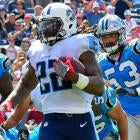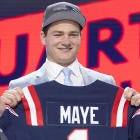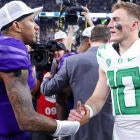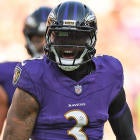NASHVILLE, Tenn. -- NFL teams averaged more pass attempts per game than any other season in 2016, a testament to the pass-first rules that make it possible. We've now become accustomed to wide-open, throw-it-around offenses, making the running game something we remember from those electric football games of yesteryear where the quarterback almost couldn't pass.
Throw to score, run to win, right?
That means you have to be able to throw the football on a consistent basis to be successful, but there are a few outliers that say maybe that is changing again.
One of those teams is the New England Patriots. Yes, the Patriots. For all the hoopla about Tom Brady, arguably the greatest quarterback of all time, the Patriots were the third in the league in rushing attempts last season behind the Dallas Cowboys and the Buffalo Bills on their way to winning their fifth Super Bowl with Brady.
"We threw it more than they did," Tennessee Titans coach Mike Mularkey said.
Not quite, but you get the point. The Titans, with their run-oriented "exotic smashmouth" offense, threw it 504 times, while the Patriots threw it 550 times. New England ranked 24th in pass attempts, while the Titans were 28th. The gap isn't nearly as great as the perception, which is that the Titans line up and pound it with something resembling a veer/wishbone offense from the 1970s, while the Patriots simply throw it around the yard with Brady.
Maybe that is the genius of Patriots coach Bill Belichick. As defenses get smaller and faster, trying to offset the spread offenses that are so prevalent in the NFL now, running the football might be coming back into vogue, like cassette tapes in the music industry (yes, it's a thing).
The Patriots averaged 30.13 rushing attempts per game last season, which was their highest average since 2012 (32.69).
The Cowboys led the league, running it an average of 31.19 times per game in 2016. The Titans ran it 29.75 times per game, and were second in the league in rushing plays on first down to the San Francisco 49ers.
The focus for the Titans was clearly to run the ball in Mularkey's offense.
"At the end of the day, we're going to physically punish you," Mularkey said during a break from training camp last week. "The most success I've had in coaching has been playing this way."
So is the run game back in vogue? Are the smart teams ready to counter-act the smaller, faster defenses?
"It's amazing how in this game it trends one way or another," Denver Broncos general manager John Elway said. "That could be the next trend."
Maybe so, but the margin for error playing a run-heavy offense, unless you have Brady, is usually smaller. It takes a dominant, almost special, defense and winning the turnover game to win a Super Bowl that way. The ball has to bounce your way all the time.
The Broncos won a Super Bowl that way when Peyton Manning was a shell of himself in 2015 behind a running game and a dominant defense.
"The margin for error is much smaller," Elway said. "Everything has to go right."
"The points still come through the passing game," said Broncos first-year coach Vance Joseph, who made his NFL stripes on the defensive side of the ball. "You can win running the ball, but you better play sound defense behind it because you won't score a lot of points. If you get behind with that style, say 14-0, you are done.
"This is still a passing league. You can do more with less in the passing game because of the matchups. Look at the Patriots. Their short passing game is like another part of their running game."
The Patriots were third in scoring last season, while the Cowboys were fifth and the Titans were 14th, which disputes that notion somewhat from last season. The Atlanta Falcons led the league in scoring and they were second in passing yards to the Saints, who were second in scoring. That means the 1-2 passing teams led in points, but the Falcons were also fifth in rushing.
So you can get it done both ways, but there are some coaches and players who just don't buy the idea of lining up and playing power football. Run it to win, but throwing it to score, is a necessity to them.
Cardinals coach Bruce Arians is one of those coaches.
"You might see a little more of that (power football) with people playing nickel against base offenses since more speed out there means you counter with power," Arians said. "But you have to put up points. If you have a nice time-consuming drive to a field goal, and they have a three-minute drive to a touchdown, you lose. You don't get credit for time of possession in this league."
Offenses used "11" personnel -- one back, one tight end and three receivers -- 60 percent of the time last season, which leads to the defense playing more nickel and dime packages. For the ninth consecutive season, the use of nickel and dime defenses was up, now over 65 percent.
"Defenses are a lot smaller and quicker, so it makes sense to run it when you can," Cardinals running back David Johnson said. "But it depends on the coaches. That's what I love about our team. BA (Arians) goes with what's working. He can attack me inside as a running back, but he can also line me up outside, move me around in the passing game, and get my hands on the ball. So we do it a little different than some teams."
The idea to overpower smaller defenses makes sense, but executing it can be tough. For one, you need a good offensive line. There aren't many of those in the NFL. With colleges moving to more spread offenses, it takes time to develop offensive lineman now, which is why so many teams struggle up front.
Taking a college lineman and transitioning him to the NFL run game can be tough, particularly with the lack of practice time. It's more built around installing now than technique teaching, which can make the learning that much tougher.
"Nobody is running it in college anymore," Elway said. "They pass block, but it's tough to adjust. That's why it can be hard to put together an offense with pounding it in mind."
The Titans and Cowboys have those types of lines that can do it, which is why they are good running teams. Titans left tackle Taylor Lewan loves the way the Titans play on offense. As a lineman, he says, there's nothing better than run blocking.
"It's a good way to take away a man's will," Lewan said. "That's the best part of it. You can see it in their eyes when you are running it in the fourth quarter. When you pass it a lot, they come at you all day. It's their advantage. When you are head up on a guy and run it, especially when they run right behind you, it will put some lead in the pencil."
The "exotic smashmouth" name is often credited to Mularkey, but he didn't come up with it. It was given to this offense when he was with the Steelers as offensive coordinator from 2001-03. They led the NFL in rushing in 2000, but they also had Kordell Stewart, known as "Slash" for his versatility playing quarterback, and former quarterback Hines Ward at receiver. They later added former quarterback Antwaan Randle El. So the run was the smashmouth part it if, and the gimmick plays were the exotics.
In Tennessee last season, there was less of the exotic and more of the smashmouth.
"I never came up with the name," Mularkey said. "But I had some fun with it. I played along with it. Whatever way they want to describe our offense, I am OK with it. It's dull, but it's the way we are. It's not like we run the ball all of the time."
What they do is use formations, especially multiple tight-end sets, to get big plays in the passing game. The Titans had 33 pass plays of 25 yards or more to rank ninth in the league, which is impressive considering the pass offense was ranked 25th overall in yards. The ability to run the ball also helped the protection, as the quarterbacks were sacked 28 times to tie the Chicago Bears and Dallas Cowboys for seventh best in the league.
To help amp up the passing numbers, the Titans drafted receiver Corey Davis in the first round last April and added Taywan Taylor in the third. They also signed Eric Decker as a free agent.
"We're trying to improve in some of those areas (receiver) to help our passing game," Mularkey said. "But we try to find an edge in our offense. We're big in deception. That's where the run game helps."
As third-year quarterback Marcus Mariota continues to improve, he will likely do more throwing than in his first two years. A quarterback in a run-first offense can sometimes get frustrated, but Mariota seemed fine with it when asked about it recently.
"As a staff, they do a great job of putting us in great situations," Mariota said.
Come on, you have to want to throw it more?
"Not necessarily," he said. "I just do what's asked of me. We have to find out what works and what doesn't. I get a chance to spread the ball around."
He just doesn't get to throw it around as much as some of the league's other passers. That might be fine with the way the game is going now, and the Titans are considered a potential playoff team and maybe even more. So just maybe the Titans are ahead of the curve. Perhaps the run game is chic and trendy again, a smart counter-move to the defenses reacting to the passing game.
I don't think it stays that way, or that you can win consistently running it without a top-level quarterback. But when smart teams like the Patriots run it more than you think with a guy like Brady under center, something's at play.
"It's all cyclical in this league, so who knows?" Elway said.
"Fans and owners want to see the ball in the air," Cardinals cornerback Patrick Peterson said. "It's more exciting. I can see a few teams going back to pounding it, but not most of them. Then again, it could go that way. I doubt it, but you never know."
So is Exotic Smashmouth, Act II, the trendsetter for a league that's about to go back in time? Or are they just an outlier, the exception to the rule?
It's probably somewhere in between, but just remember the rules have made this a passing league, and there's a reason the quarterbacks make the big money.






















